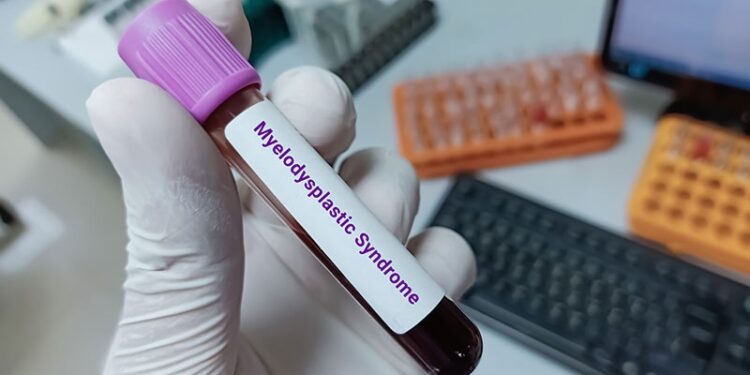MILAN — Immune-based treatments continue to fall short in myelodysplastic syndromes (MDS). Now, experts from the European Hematology Association’s (EHA) Specialized Working Group on MDS here at the EHA 2025 Congress are reevaluating their core strategies, from clinical trial endpoints to patient selection and timing.
The researchers are suggesting the need for a shift in how these therapies are developed and deployed, as new data suggests that current benchmarks might be missing meaningful responses and that immune dysfunction in MDS can evolve over time.
MDS are a heterogeneous group of clonal myeloid stem and progenitor cell disorders marked by ineffective hematopoiesis, cytopenias, and a risk of progression to acute myeloid leukemia. Immune dysregulation is thought to be a key driver in MDS pathogenesis, raising hopes that modulating immune responses within the bone marrow niche could alter disease trajectory. Yet, despite numerous attempts, immune-based interventions have largely failed to yield meaningful clinical results.
Choosing the Right Endpoints
Currently, few therapies targeting inflammation and immune activation are approved for MDS — namely antithymocyte globulin, with or without cyclosporine A, lenalidomide, and luspatercept.
However, a growing list of investigational agents is under study, including cytokine inhibitors, signaling pathway inhibitors, immune checkpoint inhibitors, bispecific and trispecific antibodies, and chimeric antigen receptor cell-based therapies.

Anne Sophie Kubasch, MD, a hematologist at the University Medical Hospital Leipzig, Germany, presented preliminary findings from two trials by the German MDS Study Group: the phase 2 CANFIRE trial of the IL-1Beta inhibitor canakinumab and the LUCAS trial of the IRAK4 inhibitor emavusertib.
The CANFIRE trial enrolled 11 patients treated for 6 months, while LUCAS included 36 patients treated for 4 months. Both studies failed to meet their primary endpoint, hematologic improvement in erythroid cells per International Working Group (IWG) 2018 criteria, by the end of the treatment period.
Despite this, Kubasch noted that several patients opted to continue treatment due to perceived clinical benefit, such as reduced fatigue or general improvement. Some also showed biomarker changes or delayed hematologic responses. These findings led her to question whether hematologic improvement in erythroid cells is the most appropriate efficacy endpoint for immunomodulatory agents.
“We can argue that current IWG endpoint criteria are too rigid for immune modulation trials,” she said. “Late or gradual responses may go undetected.”
Kubasch suggested that future trials should incorporate patient-reported outcomes and quality-of-life metrics as co-primary endpoints. “We may focus on composite endpoints combining various parameters, such as hematologic trends, biomarker shifts, molecular remission or stability, and, of course, patient-reported benefits.”
Selecting the Right Patients
A second key question, Kubasch said, is whether the right patients are being selected for immunotherapy. She cited a recent transcriptomic analysis of bone marrow CD34+ cells from 183 MDS patients that identified two immune subtypes based on the expression of six genes — including IRAK4, the target of emavusertib. These subtypes were called hyperactive (HIC) and moderate (MIC) immune clusters. The HIC group had greater activation of immune-related pathways and higher infiltration of natural killer cells and M1 macrophages.
“We might be treating the wrong immune subgroup with immunomodulators,” she said, hypothesizing that it’s possible that only MIC patients were being enrolled in their trials, contributing to negative results.
She proposed a stepwise stratification approach:
- Baseline assessment (low-risk MDS diagnosis, anemia, transfusion burden)
- Genetic stratification (cytogenetics, mutations, resistance markers)
- Immune transcriptomic profiling (HIC/MIC clustering)
“Selective inclusion of patients with immune activation, such as those with an HIC profile, is essential,” she concluded.
Targeting the Right Immune Alterations
Valeria Santini, MD, associate professor of hematology at the University of Florence Medical School, Italy, focused her remarks on immunosuppressive therapy, a long-used but inconsistently effective strategy in MDS.
To re-evaluate its role, Santini reviewed older literature — what she called “archaeological digging.” She showed that complete responses and survival benefits are achievable in some patients, albeit rarely.
Importantly, she emphasized that immune dysfunction in MDS is dynamic. “It changes during the course of the disease,” she said. Therefore, precise immune profiling at both the subtype and patient level is needed. Optimization of immunosuppressive therapy is hampered by the lack of prospective randomized trials, heterogeneity in study populations, poor characterization of immune abnormalities, and the need for integration with novel agents. “It is not one cure for all,” she said. “By selecting patients, we might be more successful than in the past.”
Finding the Right Drugs and the Right Timing
Lionel Adès, MD, PhD, professor of hematology at Saint-Louis Hospital, Paris, France, commented to Medscape Medical News that, while the biological rationale for immune modulation is strong, clinical evidence remains weak.

“Maybe we don’t have the right drugs or combinations. Maybe we’re using them too late in the disease course,” he said. Immune dysregulation might play a role early in MDS, but by the time patients are treated, it could be too late to alter the disease with immune-targeted agents.
Moreover, Adès noted that immune therapies often require extended treatment periods before activity can be detected, while traditional MDS trial endpoints focus on earlier timepoints. “If a drug appears completely ineffective, it’s not ethical to keep a patient on trial for a year just to see if something happens,” he said.
Still, he remains cautiously optimistic. He pointed to the EHA-sponsored i4MDS Consortium, which aims to deepen understanding of MDS immunobiology, and to data from the STIMULUS MDS 2 study presented during the session by Amer Zeidan, MBBS, MHS, of Yale University, New Haven, Connecticut. That study evaluated the TIM-3 immune checkpoint inhibitor sabatolimab plus azacitidine as a first-line therapy in MDS. Although the trial failed to show a survival advantage overall, subgroup analysis revealed a benefit among female patients.
“This is something very interesting,” Adès said. “It’s something we didn’t look at before, because we never thought survival could differ between male and female MDS patients.” While sabatolimab development has since been discontinued, other agents targeting the same pathway remain in the pipeline. “This finding could be valuable for stratifying future trials by sex,” he said.
Kubasch reported relationships with BMS, Curis, Jazz, Johnson & Johnson, and Novartis. Santini reported serving on advisory boards for AbbVie, Ascentage, BMS, Geron, GSK, Keros, Novartis, Servier, and Takeda. Adès disclosed research support from BMS/Celgene and AbbVie, and advisory roles with AbbVie, Amgen, BMS, Jazz, Novartis, Roche, and Takeda.
Elena Riboldi, PhD, is a medical writer and science communicator with a background in pharmaceutical chemistry and a PhD in biotechnology. Riboldi conducted research in immunology in Italy and the United States before transitioning to medical writing, where she focuses on translating complex scientific and clinical topics into clear, evidence-based content for healthcare professionals.
Source link : https://www.medscape.com/viewarticle/immune-modulation-mds-our-core-strategies-need-change-2025a1000fxr?src=rss
Author :
Publish date : 2025-06-13 16:29:00
Copyright for syndicated content belongs to the linked Source.














